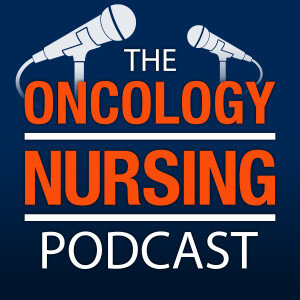
Episode 321: Pharmacology 101: CYP17 Inhibitors
 2024-07-19
2024-07-19
Episode 321: Pharmacology 101: CYP17 Inhibitors
“I think we’re in a scientific golden age for prostate cancer and probably cancer as a whole, but we’re talking about prostate cancer today. So I’m excited to be sitting on the front lines, seeing the new ways that we can help our patients. But I do still think CYP17 inhibitors will continue to be one of our main weapons against prostate cancer for a very long time,” Andrew Ruplin, PharmD, clinical oncology pharmacist at Fred Hutchinson Cancer Center in Seattle, WA, told Jaime Weimer, MSN, RN, AGCNS-BS, AOCNS®, manager of oncology nursing practice at ONS, during a conversation about the CYP17 inhibitor drug class.
Music Credit: “Fireflies and Stardust” by Kevin MacLeod
Licensed under Creative Commons by Attribution 3.0
Earn 0.5 contact hours of nursing continuing professional development (NCPD) by listening to the full recording and completing an evaluation at myoutcomes.ons.org by July 19, 2026. The planners and faculty for this episode have no relevant financial relationships with ineligible companies to disclose. ONS is accredited as a provider of NCPD by the American Nurses Credentialing Center’s Commission on Accreditation.
Learning outcome: The learner will report an increase in knowledge related to CYP17 inhibitors.
Episode Notes
- Complete this evaluation for free NCPD.
- Oncology Nursing Podcast episodes:
- Pharmacology 101 series
- Episode 242: Oncology Pharmacology 2023: Today’s Treatments and Tomorrow’s Breakthroughs
- Episode 154: New Drug Approvals for Metastatic Castration-Sensitive Prostate Cancer
- ONS Voice article: The Case of the Genomics-Guided Care for Prostate Cancer
- ONS course: Safe Handling Basics
- ONS books:
- Chemotherapy and Immunotherapy Guidelines and Recommendations for Practice (second edition)
- Safe Handling of Hazardous Drugs (fourth edition)
- Clinical Journal of Oncology Nursing article: Navigating Treatment of Metastatic Castration-Resistant Prostate Cancer: Nursing Perspectives
- Oncology Nursing Forum articles:
- Interventions to Support Adherence to Oral Anticancer Medications: Systematic Review and Meta-Analysis
- ONS Guidelines™ to Support Patient Adherence to Oral Anticancer Medications
- ONS Huddle Card: Hormone Therapy
- ONS Biomarker Database (refine by prostate cancer)
- ONS Learning Libraries:
- Cancer of the Genitourinary Tract
- Oral Anticancer Medication
- Oral Chemotherapy Education Sheets
To discuss the information in this episode with other oncology nurses, visit the ONS Communities.
To find resources for creating an Oncology Nursing Podcast™ Club in your chapter or nursing community, visit the ONS Podcast Library.
To provide feedback or otherwise reach ONS about the podcast, email pubONSVoice@ons.org.
Highlights From This Episode
“Identification of CYP17 as a target to decrease androgen production led to the first synthesis of a dedicated inhibitor of CYP17 named abiraterone acetate in the 1990s. But it would also not be until 2011, when there was sufficient evidence through clinical trials, for the [U.S. Food and Drug Administration] to approve abiraterone as treatment for castrate-resistant prostate cancer. And since then, abiraterone has been studied in many different stages of prostate cancer and has demonstrated clear benefits to survival for patients with metastatic or nonmetastatic prostate cancer and in the castrate-sensitive setting, as well.” TS 3:07
“Patients on abiraterone, regardless of the formulation that they get, they also have to receive an oral steroid every day while undergoing treatment due to the risk of that mineralocorticoid excess. … CYP17 inhibition by abiraterone leads to the loss of negative feedback on the adrenocorticotropic hormone, or ACTH, through a relative cortisol deficiency, which then results in higher levels of ACTH, which then cause the formation of excess precursors, including those mineralocorticoids that are upstream of the CYP17 inhibition step of androgen formation.” TS 14:04
“I recommend that patients take the standard formulation of abiraterone on an empty stomach. Conversely, I do recommend patients take their steroids with food to reduce the chances of [gastrointestinal] upset from their steroids. And so, I emphasize to these patients that abiraterone and the steroid do not need to be taken together at the same time, even though they are both a component of their treatment, and that they probably should, in fact, take them a little bit separately.” TS 23:00
“Now we’re really in the phase of studying combination treatments, and we’ve had some really good results so far. So, one of the combinations that made a splash a few years ago is what we call triplet therapy, so abiraterone plus docetaxel plus [androgen-deprivation therapy], docetaxel being a traditional cytotoxic chemotherapy that’s been used in prostate cancer for several decades now. But now we’re combining it with CYP17 inhibitors and other novel hormonal therapies, which has been exciting. So, this has been implemented into the standard of care for metastatic hormone-sensitive prostate cancer.” TS 27:26
More Episodes
Create your
podcast in
minutes
- Full-featured podcast site
- Unlimited storage and bandwidth
- Comprehensive podcast stats
- Distribute to Apple Podcasts, Spotify, and more
- Make money with your podcast
It is Free
- Privacy Policy
- Cookie Policy
- Terms of Use
- Consent Preferences
- Copyright © 2015-2024 Podbean.com





